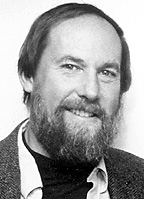Stephen Dunn, “Madrugada”

No word for it in English, that time
between midnight and dawn. Most of us
are asleep by then, outrunning leopards
on blue lawns, or avenging our daily lives.
But in South America many are awake.
I see them dancing in the madrugada
all madrugada long. Even those workingquietly in their rooms at 3 A.M.—
it pleases me to think—are doing so
in the madrugada. I love how life nags
and language responds.
But if I were to fly to Caracas or Lima
to live the word and to say it out loud,
no doubt it would start to rhymewith grunts from bar fights
and the muffled cries of women
forced into cars, and in dim-lit rooms
the silence of money sliding
into someone’s hand. Madrugada,
I might say then, without pleasure,
its meaning so consonant with the world.
From Everything Else in the World. Other poems from this collection include “The Kiss.” Last month, The New Yorker ran a new Dunn poem, “History.”
In an interview with The Cortland Review, Dunn speaks to the importance of creative tenacity: “Poetry doesn’t reveal its secrets to the occasional poet. Be as committed as, say, a violinist or a ballerina would be. No shortcuts. Young poets may be the only would-be artists I know who actually believe they might be able to pull something off because they have strong feelings about it and who are not embarrassed when they hit false notes. Finally, you must be a little driven, and what you’re doing must be crucial to you in order not to be defeated by the likely neglect that awaits you, the lack of rewards, and the fact that, by and large, your culture doesn’t take you seriously.”
8 April 2008 | poetry |

 Our Endless and Proper Work is my new book with Belt Publishing about starting (and sticking to) a productive writing practice.
Our Endless and Proper Work is my new book with Belt Publishing about starting (and sticking to) a productive writing practice. 
